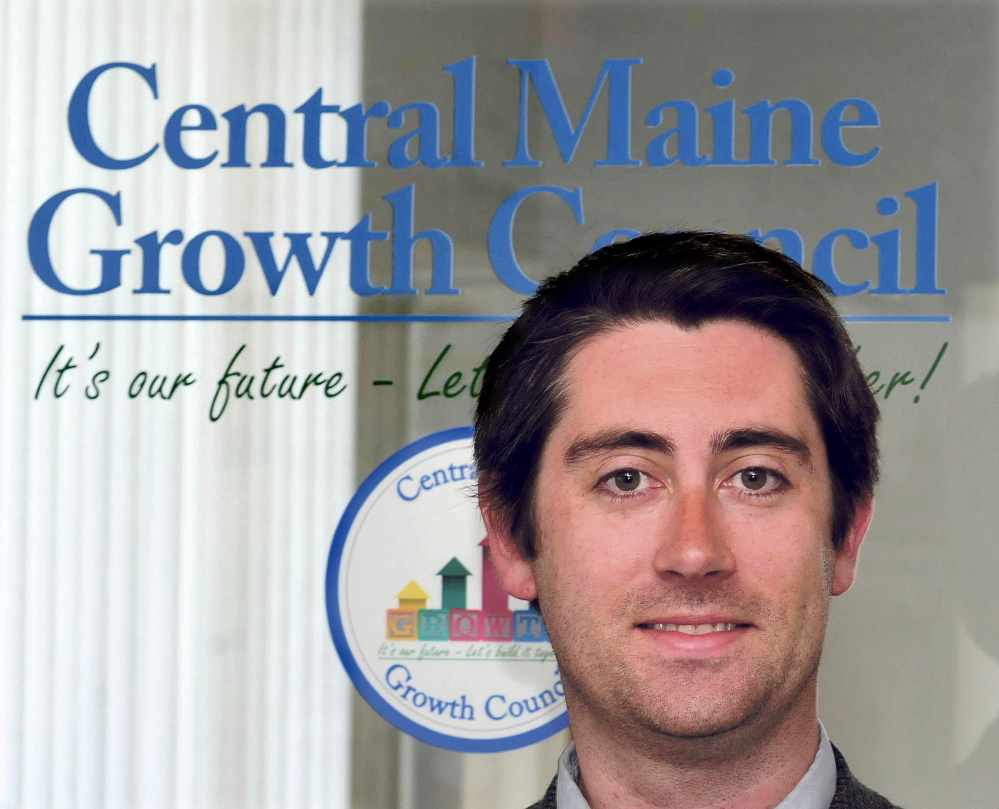WATERVILLE — The Central Maine Growth Council has hired an economic development specialist and restructured its organization in an effort to kick-start its mission to promote economic growth in the Waterville area.
Garvan D. Donegan, a recent graduate of the Muskie School of Public Service at the University of Southern Maine, started work at the beginning of the month at the council.
The council opted to hire someone to focus exclusively on economic development instead of replacing executive director Darryl Sterling, who stepped down from the position last year.
Kimberly Lindlof, president and CEO of the Mid-Maine Chamber of Commerce, was appointed interim executive director after Sterling’s departure and will remain in the position. The council will contract with the chamber for administrative and bookkeeping duties, freeing Donegan to work directly on economic development.
“He can focus his energies on being out there, boots on the ground, getting in front of businesses,” Lindlof said.
The council is funded by Waterville, Winslow and Fairfield and a number of local businesses. It operates in an office at the Mid-Maine Chamber’s headquarters on Elm Street.
The council’s board of directors considered reorganization after Sterling’s departure, Lindlof said. The executive director was responsible for budgeting, fundraising and administration, which detracted from the focus on economic development. The costly and ineffective “one-man show” structure meant that projects and opportunities sometimes fell through the cracks, Lindlof said.
“The goal is to be more efficient and more effective,” she said.
The council’s board created a new job description for the economic development specialist position and selected Donegan from a pool of applicants.
“We really felt that he had capacity,” Lindlof said. “We wanted somebody who is eager, had fire in his belly, had the capacity to grow, learn our area and learn our businesses.”
Donegan, 29, a Cape Elizabeth native, has worked on projects for the city of Portland, the town of Bowdoinham and a number of businesses and nonprofits. He received a bachelor’s degree in political science and environmental sciences from Eckerd College in St. Petersburg, Florida, in 2008, and is finishing his master’s degree in community planning and development from the Muskie School of Public Service.
His overarching goal is to build collaboration among governments, businesses, academic institutions, and arts and cultural agencies in the region.
“I really hope this results in a highly desirable, multi-town community that makes folks want not only to move here and move their businesses here, but also stay here,” Donegan said.
“I know that’s kind of broad,” he admitted, “but at the macro-level that’s my goal: to foster that robust regional economy and cultivate collaboration between those different identities.”
Waterville historically has been a manufacturing center and Donegan expects that will continue to be an important sector. However, the area also has opportunities for other rising industries, such as telecommunications, health care and biomedical services.
Workforce development is one of the area’s central challenges, Donegan said. Creating the resources to prepare students with “deep learning skills” will be critical to fill current jobs and meet the needs of future employers.
Developing a foreign trade zone in Waterville will also be an early focus for Donegan. Companies in the zone can pay lower duty fees on imported materials or finished products. The zone presents an incentive for businesses to locate in the area, but the program is complicated and can be intimidating, Donegan said.
“Anytime there’s change, I think that’s difficult,” but overall the trade zone is a good economic tool, he said.
In an interview this week, Waterville City Manager Michael Roy said having a development specialist on staff was in the best interest of all members of the growth council.
“I think a regional approach for economic development is just so very important, because no one community can afford economic development on their own,” Roy said. “Financially and operationally, it makes so much more sense to do a shared position.”
Peter McGuire — 861-9239
Twitter: PeteL_McGuire
Send questions/comments to the editors.




Success. Please wait for the page to reload. If the page does not reload within 5 seconds, please refresh the page.
Enter your email and password to access comments.
Hi, to comment on stories you must . This profile is in addition to your subscription and website login.
Already have a commenting profile? .
Invalid username/password.
Please check your email to confirm and complete your registration.
Only subscribers are eligible to post comments. Please subscribe or login first for digital access. Here’s why.
Use the form below to reset your password. When you've submitted your account email, we will send an email with a reset code.